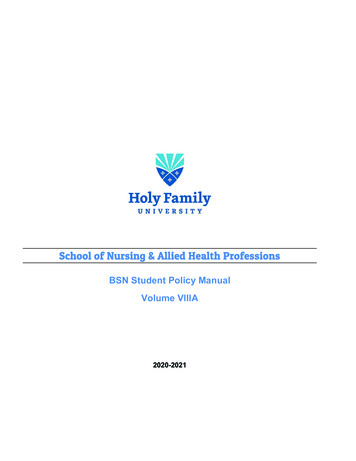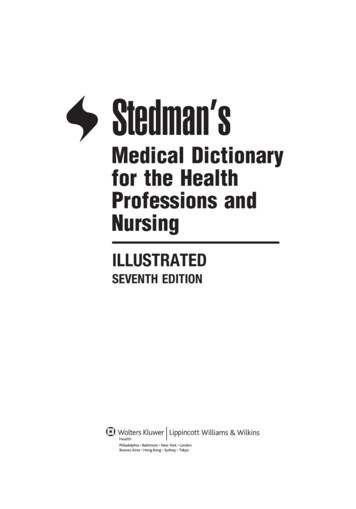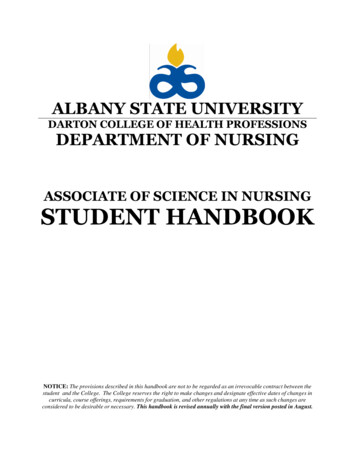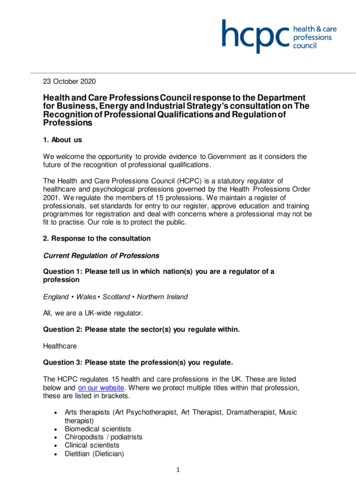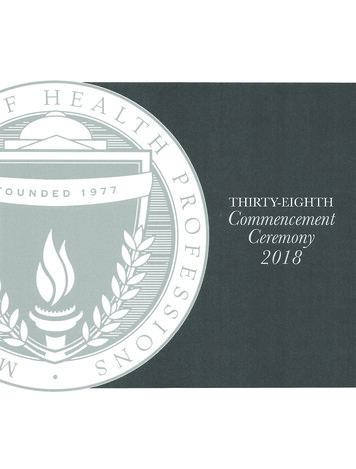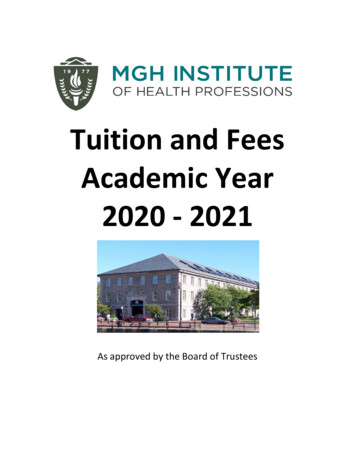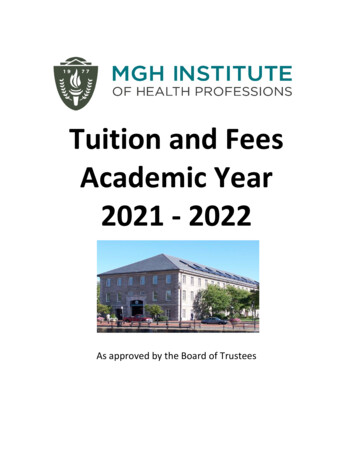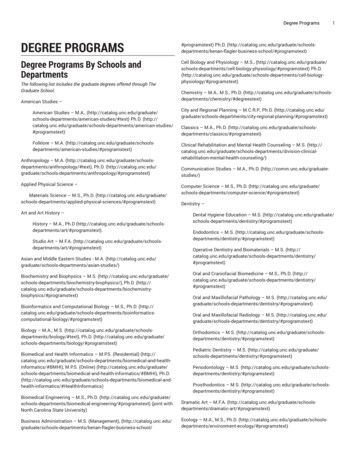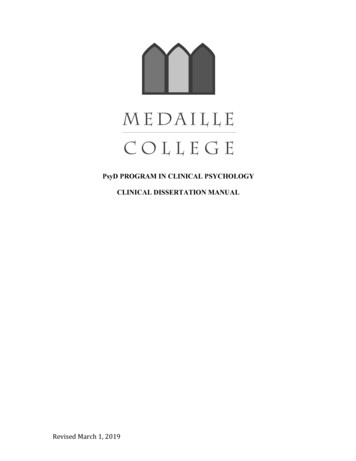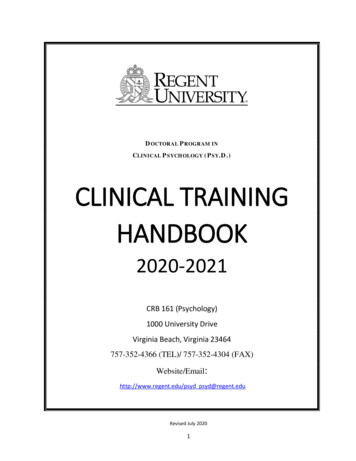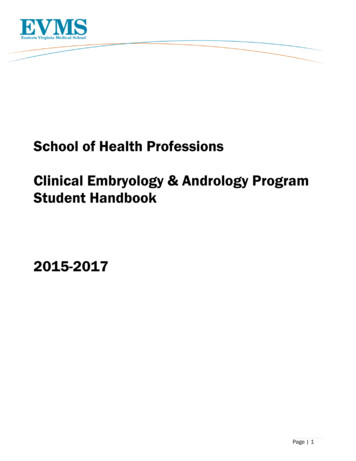
Transcription
School of Health ProfessionsClinical Embryology & Andrology ProgramStudent Handbook2015-2017Page 1
TABLE OF CONTENTSSCHOOL OF HEALTH PROFESSIONS BACKGROUND 6PRE-MATRICULATION REQUIREMENTS 6POLICY 6PROCEDURE 6GRADING SCALE 7GRADE POINT CALCULATION 7INCOMPLETE GRADES 7WITHDRAWALS 8PROGRESS REVIEW 8GRADE APPEALS 8SATISFACTORY ACADEMIC PROGRESS 8TRANSFER CREDITS 9EVMS CREDIT DETERMINATION POLICY 9POLICY 9PROCEDURE 9Assigning Credit Hours 9ACADEMIC AND NON-ACADEMIC DEFICIENCIES 10DEFICIENCIES 10IDENTIFICATION AND REMEDIATION OF DEFICIENCIES 11ACADEMIC AND NON-ACADEMIC GRIEVANCE AND APPEAL PROCEDURES 11WELCOME 12BRIEF PROGRAM HISTORY 12PURPOSE 12MISSION STATEMENT 12GOALS AND OBJECTIVES 12ACCREDITATION 13KEY PROGRAM CONTACT INFORMATION 14PROGRAM FACULTY 15Page 2
TECHNICAL STANDARDS 17REGISTRATION 19COURSE REGISTRATION 19STUDENT FINANCES 19PAYMENTS 19TUITION STATEMENTS 19FINANCIAL AID 19FINANCIAL AID AND ACADEMIC PROBATION 19ATTENDANCE 20ONLINE PROCEDURES 20EXAMINATION PROCEDURE 20REVIEWING SECURE EXAMS 20ASSIGNMENT PROCEDURE 20GRADES 21COURSE SURVEYS AND EVALUATIONS 21INSTRUCTOR RESPONSE TIME 21CLASS DEMEANOR 21EMAIL 21DISCUSSION BOARD 21TROUBLESHOOTING 22GRADING POLICIES 22TRANSFER CREDIT 22GRADING POLICY 22MAKE-UP POLICY 22LATE ASSIGNMENTS 22INCOMPLETE POLICY 22STUDENT PROGRESS 23CEA ACADEMIC STANDING, WARNING AND PROBATION 23PROFESSIONALISM AND SCHOLARLY REQUIREMENTS 24CEA WRITING STYLE 24CAPSTONE/THESIS WRITING STYLE GUIDELINES 24Page 3
THE EVMS HONOR SYSTEM 24PLAGIARISM/ TURNITIN PROGRAM POLICY 25GRADUATION REQUIREMENTS 26LENGTH OF TIME TO COMPLETE THE MASTER’S DEGREE 26GRADUATION 26CEA PROGRAM REQUIREMENTS 27EVMS LABORATORY SAFETY AND ADDITIONAL TRAINING COURSES 27EVMS SCIENTIFIC MISCONDUCT POLICY 27EVMS STUDENT PUBLISHING POLICY 27CURRICULUM 28COURSE DESCRIPTIONS 29BIOCHEMISTRY AND MOLECULAR CELL BIOLOGY 29LABORATORY TECHNOLOGY 29CURRENT TOPICS IN IVF 30FEMALE REPRODUCTIVE ENDOCRINOLOGY AND INFERTILITY 30GAMETES AND EMBRYOS 31RESEARCH METHODS CAPSTONE/THESIS: STATISTICS 31RESEARCH METHODS AND THESIS: CAPSTONE/THESIS TOPIC SELECTION AND PROPOSAL 32MALE REPRODUCTIVE FUNCTION AND DYSFUNCTION 32IN VITRO FERTILIZATION 33GENETICS OF REPRODUCTION AND INFERTILITY 33CRYOPRESERVATION 34ETHICS, SOCIETY, LAW AND ART 34RESEARCH METHODS AND CAPSTONE/THESIS: RESEARCH AND SCIENTIFIC WRITING 35PROFESSIONAL SOCIETIES 36SOCIETY OF ASSISTED REPRODUCTIVE TECHNOLOGY (SART) 36AMERICAN SOCIETY FOR REPRODUCTIVE MEDICINE (ASRM) 36AMERICAN ASSOCIATION OF BIOANALYSTS (AAB) 36FAQs 37APPENDICES 39STUDENT CHECKLIST 40Page 4
TRACK AND MASTER’S TOPIC SELECTION FORM 42RESULTS OF MS MASTER’S PROJECT PROPOSAL PRESENTATION 43REQUIREMENTS HAVE NOT BEEN MET 44THESIS / DIPLOMA DELIVERY 45THESIS ACCEPTANCE AND PROCESSING 46M.S. in Biomedical Sciences—Clinical Embryology and Andrology Program 47Certification for Graduation 47To be completed by CEA Office 47Indicate the status of the following: 47CLASS OF 2017 – YEAR 1 48CLASS OF 2017 – YEAR 2 49CEA PROGRAM CURRICULUM 50Page 5
SCHOOL OF HEALTH PROFESSIONS BACKGROUNDThe EVMS School of Health Professions (SHP) provides an administrative structure for multiple academic programs,including Art Therapy and Counseling (MS), Biomedical Sciences (PhD), Biomedical Sciences Research Master’s (MS),Biotechnology (MS), Laboratory Animal Science (MS), Master of Public Health (MPH), Master of Physician Assistant(MPA), Medical Master’s (MS), Master of Surgical Assisting (MSA), Clinical Embryology and Andrology (MS), and theVirginia Consortium Program in Clinical Psychology (PhD). EVMS serves as the school of record for all programs shownabove except Clinical Psychology; other policies and procedures may be applicable for that program based on schoolof record responsibilities. In addition to the policies and procedures depicted below, each program may haveadditional grading or other essential requirements that are communicated to students in writing at the initiation oftheir first semester or at other times as deemed necessary.PRE-MATRICULATION REQUIREMENTSPOLICYIt is the policy of EVMS that all students accepted into the Schools of Medicine and Health Professions must completeall pre-matriculation requirements, as set forth in the Conditions of Acceptance letter signed by the student, prior tomatriculation.PROCEDUREThe Admissions and Enrollment Office will track all pre-matriculation requirements and will initiate the process towithdraw students who are non-compliant after the date of matriculation, except as set forth below.If an applicant is accepting an offer of admission within the three week period prior to matriculation, that student willhave a three week period from the date the offer is accepted to complete all pre-matriculation requirements. TheAssociate Dean for Student Affairs will track these requirements for MD students. The applicable Program Directorwill track these requirements for Health Professions students. At the end of the three week period, the AssociateDean for Student Affairs shall initiate the process to withdraw students who are non-compliant.No financial aid will be disbursed to any student until all pre-matriculation requirements have been satisfied.The time frame for completing pre-matriculation requirements may be extended, at the discretion of the AssociateDean for Admissions and Enrollment or Associate Dean of Student Affairs, as applicable. For Health Professionsstudents, the appropriate Health Professions Program Director will also be consulted.Page 6
GRADING SCALEAll SHP programs for which EVMS serves as the school of record will use the following grading scale for those coursesin which grades affect the Grade Point Average (GPA).GradeAA–B BB–C CC–D DD–F Grade 0.00Grades not affecting GPA:AU AuditI IncompleteP PassW Official WithdrawalWF Unofficial WithdrawalA grading structure that is consistent with program or departmental guidelines will be established for each class bythe instructor. These requirements, along with the goals and requirements for each course, the nature of the coursecontent, and the methods of evaluation, are communicated to students at the initiation of each course. Programs areresponsible for sending grade reports to students at the end of each term.GRADE POINT CALCULATIONThe grade point average is calculated by dividing the accumulated number of grade points earned by theaccumulated number of credit hours attempted. Grades of “F” and repeats are included, but official withdrawals,audits, and grades on non–credit courses, non–degree credit courses, and pass/fail courses are not. If a student isrequired to repeat a course or receives permission from a program director to repeat a course, the grade pointaverage will be calculated using only the repeated course grade and the corresponding point value. However, theoriginal grade assigned for that course will remain on the transcript.Grades in courses accepted for transfer credit are not counted in the computation of grade point average.Students must have a cumulative grade point average of 3.00 or higher for graduation. Students falling below theminimum GPA requirement may be placed on probation or suspended in accordance with procedures establishedbelow and by each program.INCOMPLETE GRADESThe grade “I” indicates assigned work yet to be completed in a given course or an approved absence from the finalexamination. When an instructor assigns a grade of “I,” a written agreement is prepared and signed by the instructorand student that specifies the work remaining to be completed and the time frame for doing so. The work should becompleted as soon as possible, but not later than the mid-point of the following grading period/semester unlessspecial written approval is granted by the Course Director and Program Director for extraordinary circumstances. Thestudent must petition the Course Director and the Program Director for such an extension at least two weeks beforethe end of the agreed upon deadline. Unless an extension has been approved by the Course Director and theProgram Director, the “I” will convert to either an “F” or the grade as specified in the written agreement after the midpoint of the semester. An “I” grade may not be changed to a “W” under any circumstances.Page 7
WITHDRAWALSA student can withdraw from a course up until the mid-point of the grading period/semester and receive a W grade.Withdrawal after the midterm is not permitted without special approval by the Program Director. However, in theevent of an illness or severe hardship beyond the student's control, the student should submit a written petition forpermission to withdraw from the course to the instructor and program director no later than the last day of classes. Ifpermission is granted by the Program Director, a grade of W is recorded. If permission is not granted, then thestudent cannot withdraw from the class. A student who stops attending classes without withdrawing is assigned a WFgrade unless the student's performance was failing, in which case a grade of F will be assigned.PROGRESS REVIEWRegular assessment of students and feedback to them is essential to effective teaching and learning. All possibleeffort should be extended to identify students whose performance is unsatisfactory and establish remedialintervention. Course instructors and program directors will regularly review the academic progress of their designatedstudents and evaluate the overall progress of each student at the conclusion of each grading term and academicyear. Each program will establish policies and procedures for completing assessments, communicating results tostudents, and documenting outcomes. Procedures for addressing performance deficiencies or circumstances thatmay prohibit students from successfully completing a program are outlined in subsequent pages in the PerformanceDeficiencies and Probation Procedures. Programs may have additional remediation policies and procedures andstudents should contact the appropriate program office or director for this information. Program Directors shallprovide periodic reports to the Dean of the School of Health Professions that summarize student progress issues fortheir respective programs.GRADE APPEALSStudents may appeal or seek remediation of a grade based on the policies and procedures established by theapplicable program. Students who desire an appeal or seek remediation of a grade should first address the issuedirectly with the appropriate course instructor and follow all program specific policies and procedures. If the issue isnot satisfactorily resolved with the course instructor, the student may appeal the decision to the Program Directorbased on program procedures. If the issue is still not resolved, the student may appeal to the Dean of the School ofHealth Professions.Additional information regarding policies and procedures not listed in this Handbook, including elective, pass/fail, andaudit course options and procedures for evaluating, dropping a course, and reporting of grades vary for each programand will be communicated to students at the initiation of their first semester and other times as deemed necessary.SATISFACTORY ACADEMIC PROGRESSAll students in the EVMS School of Health Professions are expected to attain a term Grade Point Average of at least3.0 to be considered in good academic standing and a cumulative GPA of at least 3.0 to graduate. Students who donot meet these criteria are subject to formal warnings, probation and/or dismissal. Students who receive a warningor are placed on probation must demonstrate sufficient academic progress in the following term, as determined bythe program director and faculty, to remain in the program. Students on probation who fail to demonstrate academicprogress in the following term will be subject to dismissal. The Program Director should consider the extent to whicha student is performing at a level necessary to attain the knowledge, skills, and competencies required to succeed inthe program, including ability to meet the cumulative GPA and other graduation requirements. All programs mustreview the academic progress of their students on a regular basis and at such intervals deemed appropriate but notless than once at the end of each grading term.Page 8
TRANSFER CREDITSTransfer of credit may be allowed for course work taken at a regionally accredited institution of higher learning, suchas the Southern Association of Colleges and Schools, for courses in which a grade of B (3.0) or higher was received ora passing grade was achieved in a pass/fail course. Doctoral programs may accept a maximum of 12 transfer credits,and master’s programs may accept a maximum of 9 transfer credits. Course grades obtained from another institutionwill not be counted in the GPA. Programs must establish and publish their criteria for accepting transfer credits aswell as their policies on accepting experiential learning, advanced placement, and/or professional certificates towardcurriculum requirements. It is the responsibility of each program to determine a student’s comprehension of therequisite material and to ensure that the course work and/or learning outcomes are comparable to that offered by theapplicable EVMS program. EVMS assumes responsibility for the academic quality of any course work or creditrecorded on the institution’s transcript.Applicants seeking to transfer academic credits or any other type of learning experience into an EVMS program shouldfollow program procedures, including the submission of transcripts and other detailed information such as syllabi,course descriptions, learning objectives, or other materials that will assist the program in determining equivalence ofcourse requirements. Decisions regarding applicability of transfer courses/credits are made by the Program Directorin consultation with the faculty as deemed appropriate. Transfer applicants should contact the program for specialapplication or credential requirements. The following programs for which EVMS serves as the school of record do notaccept transfer credits: Art Therapy and Counseling, Laboratory Animal Science, Physician Assistant, MedicalMaster’s, Surgical Assisting, Clinical Embryology and Andrology.EVMS CREDIT DET
(MPA), Medical Master’s (MS), Master of Surgical Assisting (MSA), Clinical Embryology and Andrology (MS), and the Virginia Consortium Program in Clinical Psychology (PhD). EVMS serves as the school of record for all programs shown above except Clinical Psychology; other policies and proc

